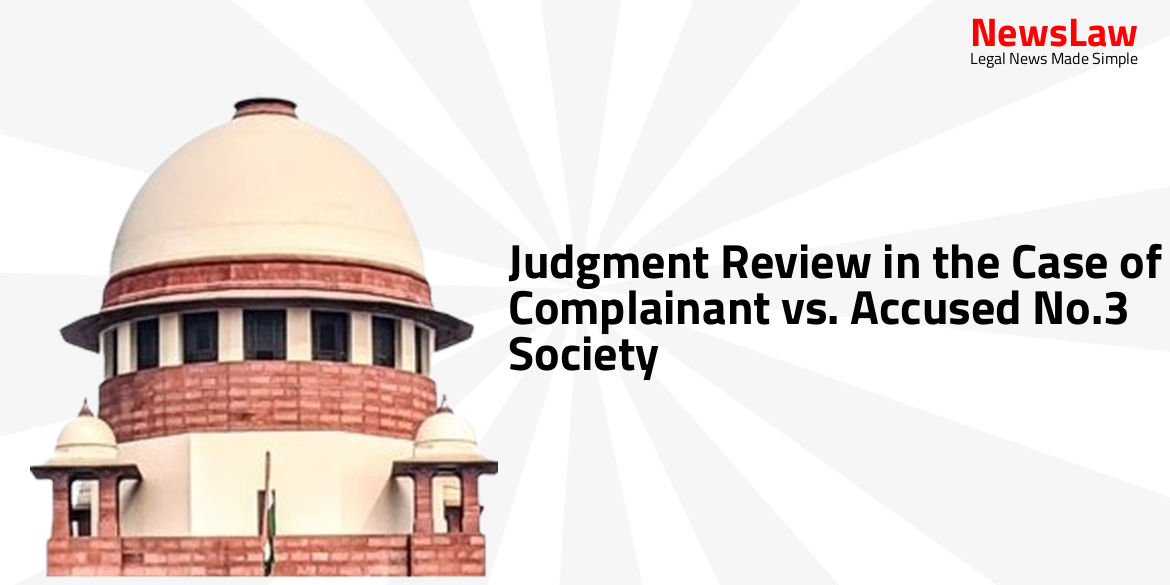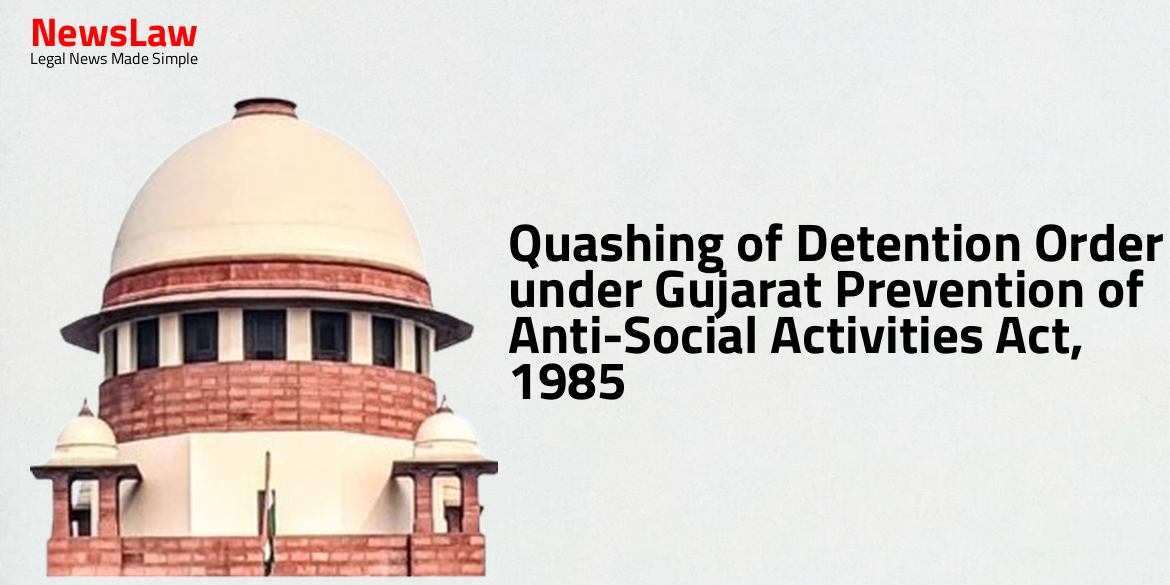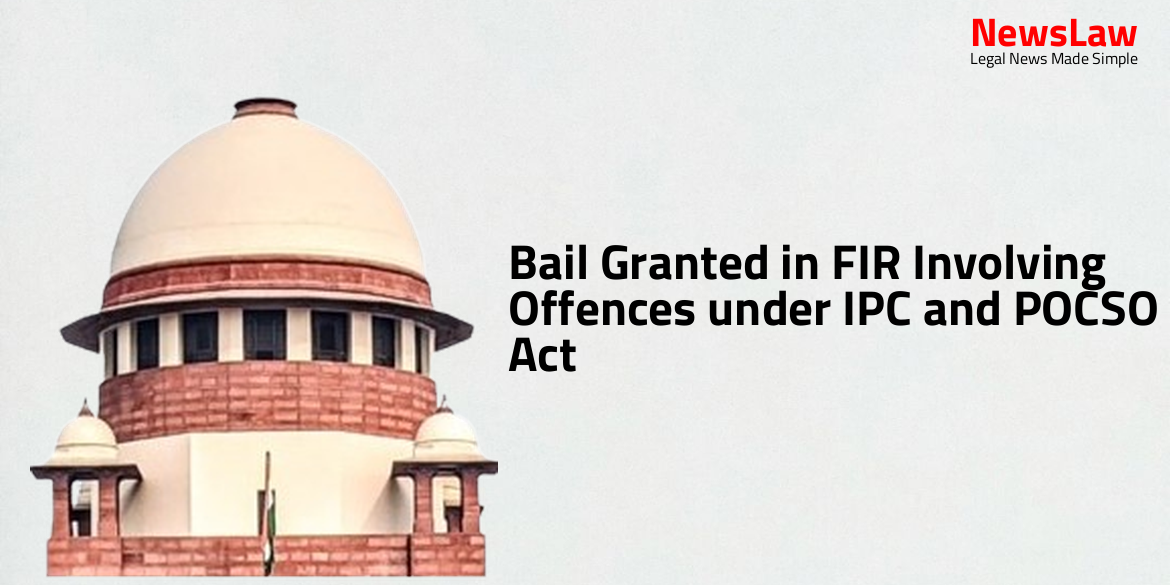The Gujarat High Court recently reviewed the judgment in a significant legal case involving the Complainant and Accused No.3 Society. This case has garnered attention due to its complex nature and the disputed events surrounding it. The Court’s review holds vital implications for the legal standing and precedents in similar cases. Stay tuned to discover the updated insights and outcomes of this compelling legal saga.
Facts
- The complainant is engaged in the business of taking contracts.
- Accused no.3 society was given a contract by the Road and Building Panchayat Department in Shihori.
- Out of the three works assigned to accused persons, two were allotted to the complainant.
- The complainant took charge on behalf of the accused no. 1 to 3 for the mentioned contracts.
- The Power of Attorney was executed on 31.05.2008 for the above contracts.
- Accused no.1 and 2 signed a cheque of accused no.3 for Rs.5,50,000.
- Accused pleaded that the advance cheque was misused by the complainant.
- False case was created to grab money from the accused.
- Communications and bills were addressed in the name of accused no.3.
- Complainant was authorized to carry out the works and was paid Rs.4,42,000 as expenses.
- Complainant invested his own funds on assurance of repayment upon receiving the bill amount.
- Cheque deposited by the complainant was returned with ‘payment stopped by drawer’ endorsement.
- Private complaint filed under N.I. Act, accused pleaded not guilty and claimed trial.
- Complainant examined and produced five documentary evidences to prove guilt of accused.
- Cheque deposited from a bank that went into liquidation in 2008, clearing of the cheque was not done.
Arguments
- The learned advocate Mr. H.V. Gajjar argues that the respondent-accused’s defense claiming alteration in the return memo lacks evidence as no bank officer was examined to support this claim.
- He further points out that the respondent-accused provided evasive replies to the demand notice and failed to present any convincing circumstances in their defense.
- Mr. H.V. Gajjar highlights that the defense’s own argument implies an attempt to defraud the complainant by issuing a cheque in 2010 despite the bank closure in 2008.
- The learned trial court’s decision to acquit the respondent-accused, despite the lack of rebuttal to the presumption in favor of the complainant and undisputed signatures, is criticized for not providing sufficient cogent reasons for the acquittal.
- Learned advocate Mr. H.V. Gajjar argues that the trial court acquitted the respondent-accused without considering material evidence.
- The judgment and order of acquittal need to be reviewed and interfered with.
- The learned trial court allegedly disregarded important evidence while acquitting the respondent-accused.
Analysis
- The complainant altered the date in the return memo issued by Gujarat Industrial Co-operative Bank for the cheque dated 07.10.2010.
- The communication from Industrial Bank stated that the bank is closed since 20.09.2008, contradicting the complainant’s claim of old cheques issued by the respondent-accused.
- No cheque number was mentioned in the communication from Dena Bank, raising doubts about the validity of the complainant’s claims.
- The complainant’s application to send the disputed cheque for handwriting analysis was granted by the court, but no opinion was produced by the respondent-accused.
- The Power of Attorney executed on 31.05.2008 included provisions for cheques issued to the complainant, but no detailed statement of accounts was provided.
- The complainant altered dates in the return memo to claim the cheque amount and file the complaint.
- The completion date of the work by the complainant was not recalled during cross-examination.
- The accused issued a notice on 20.10.2010 demanding blank cheques, a fact not disputed by the complainant.
- The private complaint alleged non-payment for work done by the complainant, supported by documents including the cheque, return memo, and bank communications.
- The burden of proof lies with the custodian of the document, in this case, to prove any alterations made.
- The communication from Dena Bank regarding dishonoring of the cheque did not mention the cheque number.
- The trial court acquitted the accused reasoning that the disputed cheque was given as part of a Power of Attorney and the work for which it was given was not completed.
- The trial court held that the complaint was false as there was no legally enforceable debt established against the accused.
- No infirmity or illegality was found in the judgment of the trial court, leading to the acquittal of the accused.
Decision
- The appeal preferred by the complainant is dismissed.
- The impugned judgment and order dated 30.12.2022 passed by the Judicial Magistrate First Class, Shihori in Criminal Case No 810 of 2015 is confirmed.
- The present appeal is dismissed.
Case Title: DINESHKUMAR BHEMABHAI GAJJAR Vs. STATE OF GUJARAT
Case Number: R/CR.A/488/2023



